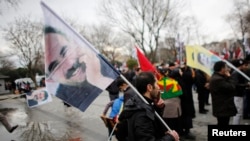Tension and angry rhetoric continue to escalate between Turkey's ruling AK Party and the pro-Kurdish Peoples' Democratic Party (HDP) as the effort to end a four-decade insurgency by the Kurdish rebel group PKK comes under increasing strain.
February 15, the anniversary of the capture of PKK leader Abdullah Ocalan by Turkish forces, was reportedly the date for both sides to issue a joint statement laying out the next steps in the peace process. Among the expectations was that Ocalan would declare a permanent cease-fire, but Kurdish leaders accuse the government of failing to offer concrete concessions.
International relations expert Soli Ozel of Istanbul’s Kadir Has University said the process is under duress.
"I think it is under a barrage of bombardment, quite frankly," he said. "Will it survive it? ... The trust that is necessary to carry on with this has gone, but we will see."
The PKK leadership, based in Iraqi Kurdistan, released a communique this month warning that the peace process was at risk of ending.
Kurdish suspicions about the sincerity of the government have been heightened by a proposed security bill that would significantly enhance police powers. Critics say the measure would turn the country into a police state. The co-leader of the Peoples’ Democratic Party, Selahattin Demirtas, said the legislation threatened to blow up the peace process.
Prime Minister Ahmet Davutoglu reiterated Monday his commitment to introduce the legislation and said the parliament would approve it, regardless of what was necessary.
Analysts say the secrecy surrounding the talks is the main factor behind the growing distrust. Since the talks began, they have centered on imprisoned PKK leader Ocalan, and access to government-selected, pro-Kurdish politicians has been strictly controlled.
Kadri Gursel, who writes about Kurdish affairs for the Milliyet newspaper and the Al Monitor website, said the process has to become more transparent if it is to make progress.
"I think the whole negotiations between Ocalan and Erdogan through emissaries, through intelligence services, through HDP delegations, et cetera, it must be made transparent, and this is what [the Kurds] demand," Gursel said.
The government rejects such calls, and it is not clear how enthusiastic Ocalan is about creating a more inclusive process.
Gursel warned that distrust, along with increasing concerns over the state of democracy in Turkey, could lead many Kurds to question whether a peaceful resolution can be found.
With Turkey in turmoil and with no hope of joining the European Union, "would then the world suggest to the Kurdish party to stay within this Turkey, if there would be an Islamic authoritarian rule in Turkey?" he said.
The government is insisting that by March 21, the Kurdish new year, the PKK announce a permanent cease-fire and disarmament — a demand that is expected to put more pressure on the peace process. Observers say any such PKK announcement is unlikely in the current climate of distrust, and that with a general election due in June, political tensions are expected to rise further.

